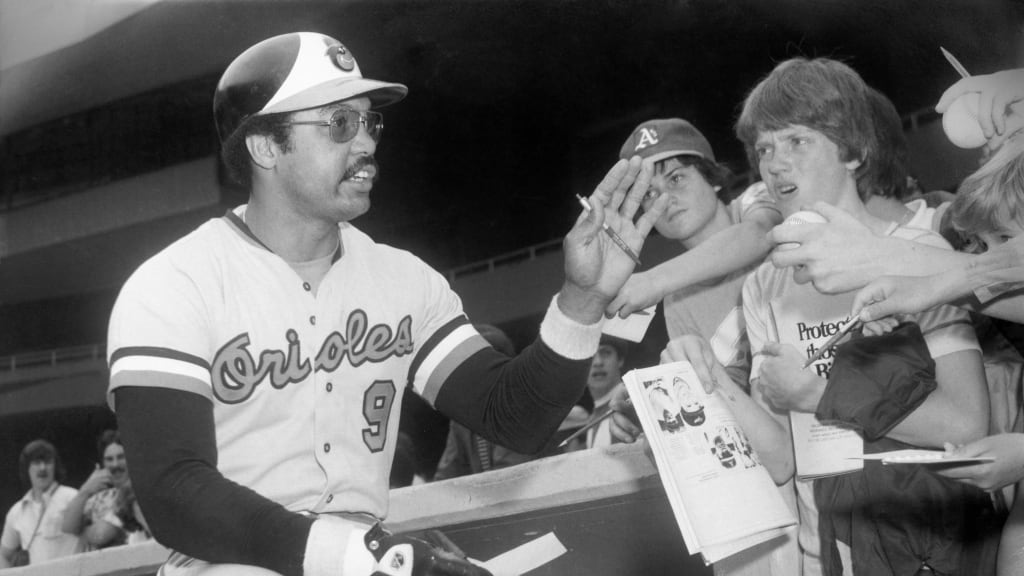
There has been a lot of good baseball conversation over the past two weeks because the Red Sox's David Ortiz made the Hall of Fame. Ortiz was the most flamboyant slugger of his time. He hit home runs, did it with swag and he won. Reggie Jackson hit more home runs and won even more than Big Papi did, and across his two-decade career in the big leagues, nobody had more swag than Jackson did.
But the one season of that career about which there isn't a lot of conversation, least when the conversation is about Reggie, is 1976. It is the year he spent with the Orioles, traded there by A's owner Charlie Finley, on his way to becoming a free agent later that year, then on his way to New York, where, as he so famously said once, he brought his star with him.
I asked him the other night what it was like in Baltimore, playing for Earl Weaver with everybody knowing he was probably just passing through, most likely on his way to the Yankees.
Reggie laughed.
"That's not the way it was," he said. "I wanted to stay. I liked the team. I liked the city. My mom was there. My dad was close by. I had other family close by. And I loved playing for Earl. When I got there, he told me, 'You know I like guys who can hit the ball over the fence, Reggie.' And I said to him, 'Earl, I can do that.'"
He held out -- for a $200,000 salary -- until May after Finley traded him and Ken Holtzman and Minor Leaguer Bill VanBommell for Don Baylor, Mike Torrez and Paul Mitchell. No one was sure what was coming with free agency. In collective bargaining, Reggie and maybe a dozen other players didn't know they were officially becoming free agents after the season was over until July.
But Finley saw the future. Reggie says Finley even tried to cut his salary 10 percent despite Reggie having just led the A's to their fifth straight division title, had been on three straight World Series championship teams and was the 1973 AL MVP.
"Baltimore would have been a really good place for me," he said. "Really good lineup. Best pitching in the league. And they were good on fundamentals the way we'd been in Oakland. Get 'em on, get 'em over, get 'em in. But the way Earl liked best once we did get 'em on was with homers. I only played 134 games that year once I got there, still hit 27 dingers and knocked in 91."
Eddie Murray, another future Hall of Famer, would show up the next season and capture the AL Rookie of the Year Award. They still had Lee May and Bobby Grich. Two years later, a kid named Cal Ripken Jr. would play his first season in the Orioles' Minor League system.
"Got to Baltimore on May 1," he said. "No Spring Training. Took batting practice at 11 o'clock at night. Played the next day. I wanted to show Earl that I was ready to answer the bell. I even played some center field for him that year. Later, I got hit in the face against the Yankees. They had to wire my jaw. I missed one game. Came back and hit a home run off Dave Lemanczyk of the Tigers."
The Yankees ended up running away with the American League East that year, winning by 10 ½ games in the end. Reggie, who turned 30 in 1976, still believes things would have been different if he had been with the Orioles on Opening Day. And he is adamant that he would have been quite happy to play the next five years of his career in Baltimore.
"During the season, I made them an offer," he said. "One point five million for five years, average salary of $300,000, which would have made me the highest-paid player at the time. Then I wanted them to throw in $30,000 a year over the length of the contract for my mom, and $30,000 for my dad. So the total value would have been $1.8 million over five."
I asked him what happened.
"They waited too long to make up their minds," he said. "And then once I had played out my option, the offers started to come in. The Expos offered me the most money, a deal for a million a year, but I didn't want to play there. Ted Turner came after me hard. But in the end, I signed with the Yankees for five years and three million. Mr. Steinbrenner threw in a Rolls-Royce."
Reggie paused and said, "It was my time, and I was gonna get paid."
Steinbrenner paid him. It was the next October when he became Mr. October in full, hitting three home runs on the only swings he made in Game 6 of the World Series against the Dodgers, and the Yankees were on top of the world, and so was he. The Yankees won again next year, giving him five World Series rings.
I asked him the other night what would have happened for the Orioles if he'd stayed.
He laughed again.
"What do you think?" Mr. October said.
